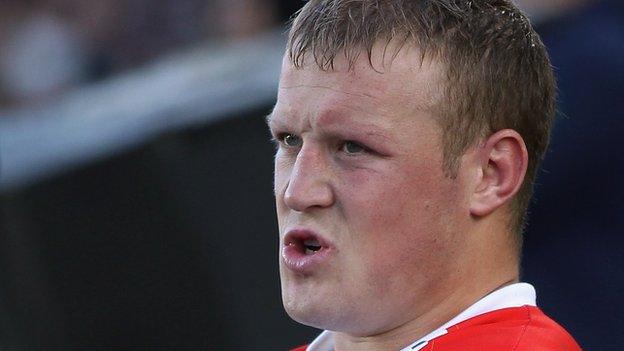European Judo Championships: Kelly Edwards targets medal after 'scary' 2016
- Published
- comments
'If I got another concussion, I could have died'
2017 European Judo Championships |
|---|
Venue: Warsaw, Poland Dates: 20-23 April |
Coverage: Reports and reaction on the BBC Sport website |
Forgoing a social life, giving up alcohol, and brutally battering your body - success does not come without sacrifice.
But how many athletes would actually dice with death in the pursuit of perfection and to achieve the ultimate dream of Olympic gold?
For British judoka Kelly Edwards, who had multiple concussions in the eight months before Rio 2016, the advice from neurological specialists was clear.
"They said if I carried on, I might die - it was that serious," she told BBC Sport.
"Even then I was insisting - 'but it's the Olympics' - it was everything I'd thought about for four years and never considered not being there."
What should have been a reality check was briefly considered 'just another challenge' before Edwards reluctantly accepted a break - meaning she would miss Rio - was not only recommended but required.
"It was devastating to miss the Olympics, but if I'd carried on and tried to get there then in the worst-case scenario, I may not be here now, or be unable to continue with a 'normal' life," said the 26-year-old.
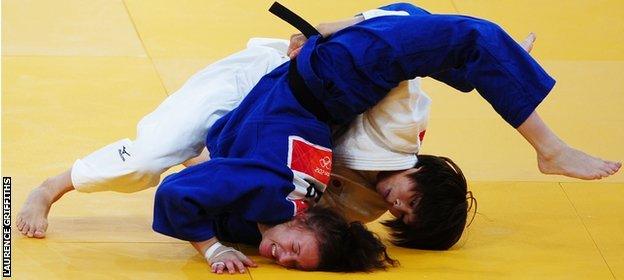
Edwards could not look at her phone or feed her cat after a series of knocks to the head
'It felt like my head was full of cotton wool'
Edwards' struggle to accept the decision was in part down to her passion for judo, but also the confusion around exactly how the problem had arisen.
She took a minor hit to the head at an event in Mongolia in July 2015, and another in Uzbekistan three months later.
Dismissing her "slow and sluggish" behaviour as jet-lag, she went on to compete in Portugal later in October - before her headaches worsened.
"It was strange because I didn't feel like I had taken any big knocks," she said.
"It was only when my team started looking back at video footage that we realised where the concussions may have happened."
She improved after resting, before an awkward landing in a competition at the end of 2015 saw the problems return.
"It felt like my head was full of cotton wool," she said.
The "fogginess" in her mind cleared during a six-week break over Christmas, and in late January last year she was back hunting for an Olympic place.
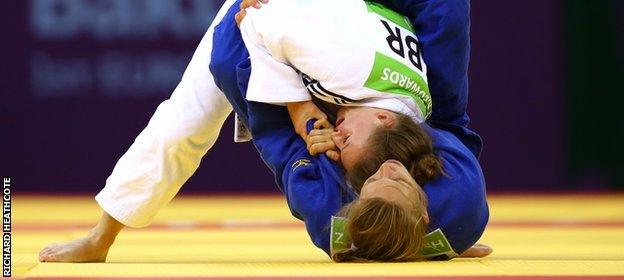
The English judoka did not realise at first that she had been badly injured during competition
'I could not even feed my cat'
The 2014 Commonwealth silver medallist came through a competition in Cuba unscathed, but a 'minor' knock at the prestigious Paris Grand Slam in February 2016 prompted the symptoms to return - with a vengeance.
"The hit felt like nothing, but the impact was so debilitating," she said.
Edwards was immediately managed using the Sport Concussion Assessment Tool, also known as Scat 3. It includes six elements, with athletes only allowed to progress to the next phase once symptoms have ceased.
She was initially ordered to rest completely and not use technology.
"It impacted every part of my life," she said. "I couldn't make my own meals, and when I'd lean over to feed my cat I was getting dizzy and falling over.
"I was sleeping for 16-17 hours a day and was still tired. Technology was a complete no-go - I couldn't look at my iPad, computer screen or TV for weeks."
Despite the precautions, her condition did not improve, and in the second phase of her recovery even going for walks and using her mobile were ruled out.
She said: "I didn't think sending a few texts to friends and family was a problem, but I was showing no improvement and had to try something different."
'A scary, invisible injury'
In those few hours she was awake, Edwards felt in a 'dream-like' state, where nothing was real.
"I didn't feel in control of the situation - I was angry, at times really, really scared, and I couldn't get my head around why it was happening," she said.
"It wasn't like a knee or shoulder problem where you're told: 'It'll be four-six weeks of recovery and this is the plan.' It was this invisible injury."
Despite an increase in media coverage and heightened concerns about the long-term impact of repeated concussions on the brain - driven by research into dead American footballers, external and boxers - very little is known about the mechanics of the condition.
In the UK, rugby union is leading the way with a new Pitch-Side Concussion Assessment (PSCA) system which aims to detect concussions early and prevent players from returning to action too soon.
However, forms of diagnosis and treatment are still very much in their infancy.
"The brain is so complex and I think that's why there's not a lot of information out there," said Edwards.
"I didn't get a lot of answers about why I suffered repeated concussions and was hearing lots of 'we don't know' which I found bizarre and really frustrating.
"Hopefully what I've been through will in some way help others."
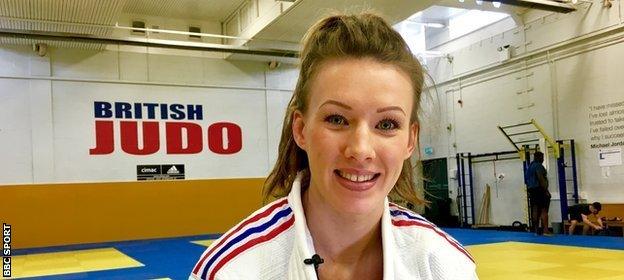
Edwards will challenge for a medal at the European Championships in Poland
'I'm a fighter, I'm a warrior'
Edwards' condition had improved considerably by the time the Rio Olympics began - in April she had resumed running drills, and by July she had returned to full contact work.
But that made watching from home all the more difficult.
"Four years earlier, I'd been in London and had the whole arena chanting my name as I came out to compete," she said.
"It was really hard not being part of an amazing Games for Team GB."
Seeing team-mate Sally Conway claim bronze helped reignite the desire to win medals again, and piece by piece she rebuilt her career.
"I was struggling doing forward and backward rolls, handstands and cartwheels - all things that used to be so easy," said Edwards, who as a child did gymnastics training five times a week.
"When I started doing judo again, if I got thrown or hit on the head I would stop and check I was OK as I was really nervous."
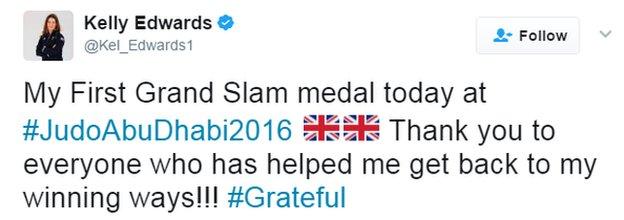
Edwards ended 2016 on a high following a difficult journey back to health
Her confidence grew, though, and she embarked on a run of career-best form, winning medals in all six events at the end of 2016 including first Grand Slam and Grand Prix honours.
"I'm a fighter, I'm a warrior, and if you can overcome the challenges then you'll be stronger than you were before," she said.
"The experience and how bad it was has given me a new lease of life and my mindset is totally different."
'Us athletes are a crazy bunch'
This week, Edwards will look to prove just how far she has come by challenging for a medal at the European Championships in Poland - her first major international since the 2015 World Championships.
Further concussions are possible, and there are no guarantees serious symptoms will not emerge again in the future.
Dr Keith Barrow, British Judo's chief medical officer, said it was unclear whether Edwards had had three or four concussions.
He added: "It was hard to tell her she had to stop pushing for the Olympics as she's an honest athlete who had worked so hard to get to Rio, but we had a duty of care.
"Concussions have been linked to mental illness and dementia so we had to think about her life outside of sport as well."
Despite the risks, Edwards is not ready to give up on her dreams.
"There's so much I still want - like being Olympic, world and European champion - but to simplify, it's about being the best I can possibly be," she said.
"I hope taking that break has put any long-term risk of [brain] damage at bay, but what fuels my life is judo and in sport there is always risk.
"Some people may find that hard to understand," she said with a smile. "Us athletes are a crazy bunch!"
- Published18 April 2017
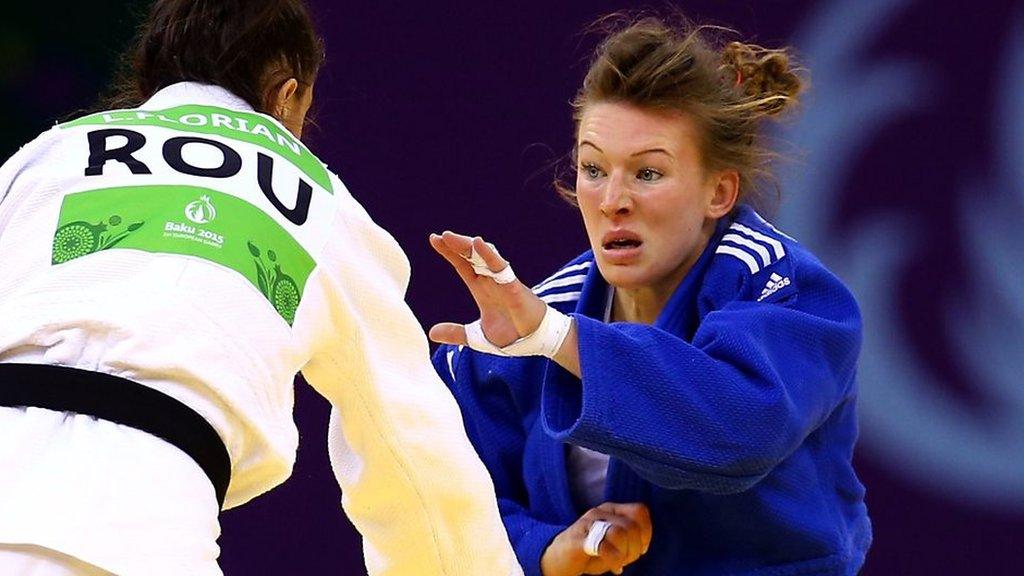
- Published18 April 2017
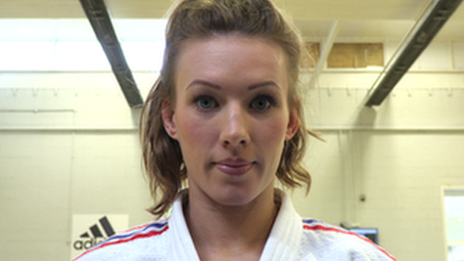
- Published17 April 2017
